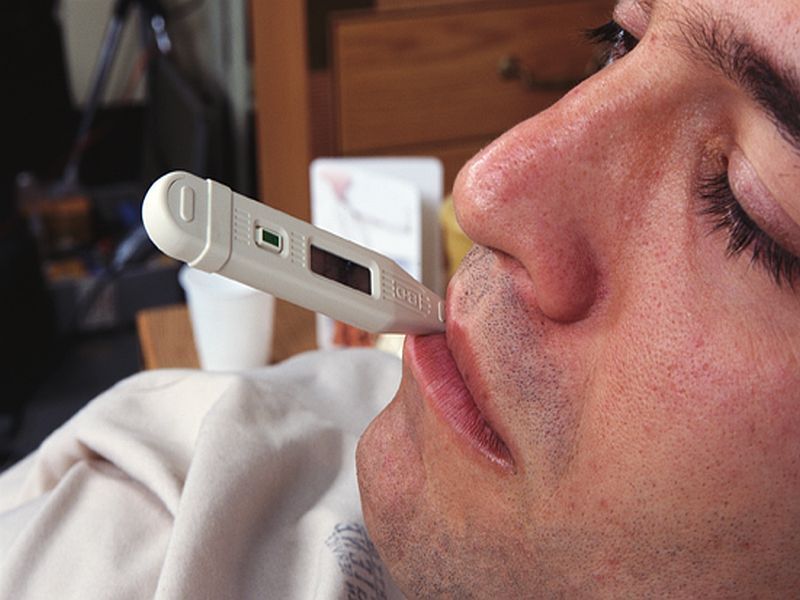
Most folks infected with COVID-19 will only have mild or moderate illness — but that means they’ll still be stuck at home and feeling really lousy.
What’s the best way to cope?
In many ways, you want to behave as you would if you were suffering from a cold or the flu, said infectious disease expert Dr. Aaron Glatt.
“The general good advice we give to people is eat well, make sure you drink enough, make sure you get enough rest, don’t overexert yourself,” said Glatt, chairman of the department of medicine and hospital epidemiologist at Mount Sinai South Nassau in Oceanside, N.Y.
“Sometimes patients do a little bit more than they can, and I don’t want to say it exacerbates things, but it exacerbates things,” he continued. “It makes them much more tired and much more fatigued and it can be sometimes like a domino effect.”
Difficulty breathing is the most troubling symptom related to COVID-19, so you might want to order a home pulse oxygen monitor (“oximeter”) to keep track of your blood oxygen levels, suggested Dr. Teresa Murray Amato, chairwoman of emergency medicine at Long Island Jewish Forest Hills in Queens, N.Y.
Fingertip monitors can be purchased online for about $20.
Blood oxygen levels “below 90 warrant at least a call to your doctor and, if persistent, a visit to your local emergency department,” Amato said.
Glatt said that those struggling to breathe “should take deep breaths consciously, trying to blow in, blow out, without getting crazy about it. Don’t get yourself winded from doing it.”
The United Kingdom’s National Health Service (NHS) says keeping your room cool can help ease feelings of breathlessness, either by turning down your heat or opening a window.
Breathing tips from the NHS also include:
- Breathing slowly in through your nose and out through your mouth, with lips pursed as though you’re blowing out a candle.
- Sitting upright in a chair, with relaxed shoulders.
- Leaning forward slightly, supporting yourself with your hands on your knees or some other stable object.
Home COVID-19 sufferers also might consider sleeping on their stomachs or their sides, Glatt said.
“You’re opening up different parts of your lungs and you’re able to aerate better, breathe better. You want to make sure your oxygen saturation is good,” he said.
COVID-19 sufferers with a cough should avoid lying on their back, according to the NHS. Instead, they should lie on their side or sit upright.
On that note, people getting bedrest who start struggling for breath might want to get up a few times per hour to move around and shake things loose, Amato said.
Over-the-counter cough suppressants aren’t much good against the dry COVID-19 cough. You might find better relief from remedies that keep the throat moist, like drinking hot tea with honey or sucking on a cough drop, according to the AARP.
People with mild or moderate COVID-19 can experience gastrointestinal issues like nausea, vomiting and diarrhea, so it’s important to stay hydrated, Amato and Glatt said.
“It’s almost impossible to hurt yourself by drinking water. You’d have to drink gallons and gallons and gallons. You can’t drink too much, most of the time,” Glatt said.
If your urine is light yellow or clear, you’re getting enough water, the NHS says.
Headaches, body aches and fevers are other common symptoms, and it’s OK to treat those with ibuprofen (such as Advil or Motrin), acetaminophen (such as Tylenol), or a nonsteroidal anti-inflammatory drug (NSAID), the experts said.
“Make sure to speak with your doctor before taking, as some people, such as people with liver issues,” may need to avoid certain over-the-counter pain remedies, Amato said.
You also should make sure you stay in touch with your doctor, either by phone or video, Amato and Glatt said.
Your doctor can recommend prescription or over-the-counter remedies for aches, fever and cough, they said.
People in the early stages of COVID-19 might also want to talk with their doctor about receiving intravenous monoclonal antibody treatment, particularly if they’re in a high-risk group, the doctors added.
More information
The AARP has more about treating coronavirus symptoms at home.
SOURCES: Aaron Glatt, MD, chairman, department of medicine, and hospital epidemiologist, Mount Sinai South Nassau, Oceanside, N.Y.; Teresa Murray Amato, MD, director, emergency medicine, Long Island Jewish Forest Hills, Queens, N.Y.; National Health Service, United Kingdom
Source: HealthDay

Leave a Reply